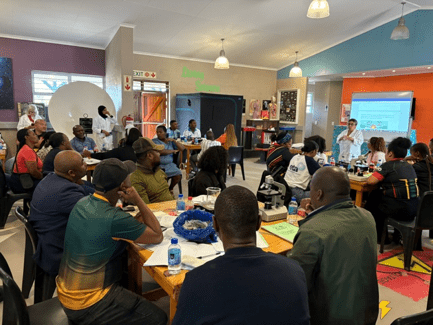Natural science and mathematics teacher training in George
Advancing Knowledge NPC (AK NPC) has over the years delivered a number of award-winning projects, programmes and SACE endorsed short courses in STEM education based on current, relevant, real-life and priority challenges in primary and secondary schools with the aim to prepare learners for the challenges of the 4th Industrial Revolution (4IR). The work of AK NPC is supported by Garden Cities Archway Foundation (GCAF) and Western Cape Education Department.
As an experienced outreach, support, training and research non-profit company for STEM (Science, Technology, Engineering and Mathematics) Education, AK NPC are regularly requested to support various organisations involved in STEM Education. One such agreement was reached with Inkcubeko Youth & Science Centre in George to deliver senior phase natural science and mathematics courses to teachers of the Eden & Central Karoo Education District, WCED in preparation of the curriculum content to be delivered in the first term of the school year.
This partnership delivered the first set of 2-day training sessions on Friday 31 January and Saturday 1 February 2025. A total of 60 teachers attended the SACE-endorsed training with 30 teachers participating in each of the mathematics and natural sciences courses respectively. The courses emphasised inquiry-based teaching strategies to deliver the first term’s content outlined in the CAPS curriculum for the two subjects. Mr Innocent Ndlovu, deputy manager of the Inkcubeko Youth & Science Centre, welcomed the participants to the centre and Prof Hartley, Director of AK NPC emphasized the importance that attending teachers must actively participate in the training to ensure that they obtain maximum benefit from the course including the SACE professional development points.
Inquiry-based natural science for senior phase (grade 7-9) teachers
The first term content of senior phase natural sciences involved the life sciences knowledge area called Life & Living. An environment of excitement and enthusiasm was created as the participants engaged with the inquiry-based activities presented by the facilitators Ms Dawn Faroe and Mr Fadli Wagiet supported by SAASTA intern Saadiqah Fraden.
Teachers were guided through the important elements of inquiry-based approach dealing with the scientific method, clarifying challenging conceptions around dependent, independent and constant variables and delving into investigative activities. Ms Faroe engaged teachers from the start of the session with food chains of animals and plants specimens, creating nests and other habitats of animals, extracting chlorophyll from leaves, testing for starch, extracting DNA from various products, viewing live plants cells and organelles under the microscope, etc. – as some of the science activities conducted.

Mr Wagiet discussed, debated and delved into vital physiological processes in humans including the reproductive system and the important understanding that learners need to have, regulatory function of the kidneys, breathing and gaseous exchange in the lungs, the heart as a powerful pump, food tests and practicals, etc. Teachers were constructively engaged through inquiry-based activities in a hands-on creative space.
The activities were specifically developed to allow ease of application in teachers’ everyday natural science classes. A number of teachers indicated that the open and frank discussions around important life processes “strengthens our strategies on how to approach sensitive curriculum content on the human body with learners in our grade 7, 8 and 9 classes”. An assessment will be arranged to measure the teaching approach of the first term content in the teachers’ individual natural science classes.
Inquiry-based approach in senior phase (grades 7-9) mathematics
The mathematics course followed a much calmer process compared to the loud and boisterous constructive noise emanating from the nearby parallel natural sciences session. The course was facilitated by Dr Victor Hess and Dr Clyde Felix supported by SAASTA intern Ms Nabeelah Layloo. The facilitators concentrated on the mathematics content of the first term including whole numbers, exponents, integers, fractions, numeric and geometric patterns, functions and relationships, and algebraic expressions and equations.
Teachers were encouraged to present their teaching approach of the content as a way of introducing a discussion in a non-threatening environment, so that the ideas and approaches of colleagues serve to add value as part of their professional development on the course. The interaction were neatly coordinated and channelled by the facilitators to progress the course. Lastly a number of learners at the centre were included to test the teaching strategies on the recipients of the course outcome. An assessment of the individual teacher’s approach in their mathematics classroom will be conducted in the first term.